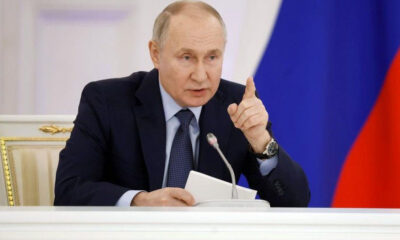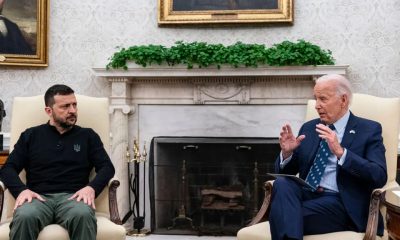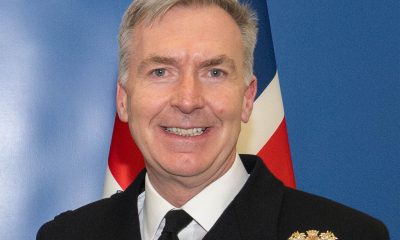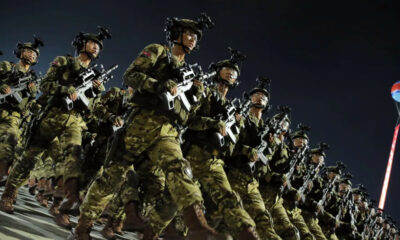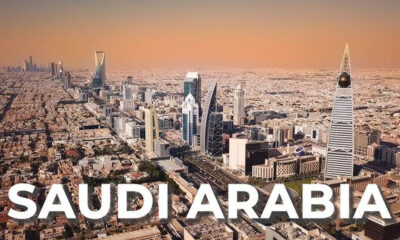International
Russia prisoner swap: Freed Americans reunite with families

Russia prisoner swap: Freed Americans reunite with families
Three Americans including Wall Street Journal reporter Evan Gershkovich, who were freed in a prisoner swap deal with Russia, have arrived back on US soil.
Mr Gershkovich, 32, was one of 16 prisoners swapped for eight Russian prisoners in what has been described as the biggest exchange since the end of the Cold War between Russia and the West.
The exchange at an airfield in Turkey also included the release of former US marine Paul Whelan, and Russian-American journalist Alsu Kurmasheva.
After touching down at Joint Base Andrews, in Maryland, Mr Gershkovich, Ms Kurmasheva and Mr Whelan emerged from the jet to cheers from those on the tarmac.
All three were greeted by US President Joe Biden and Vice-President Kamala Harris – before each embraced their families.
They lingered on the tarmac for photographs and conversations before leaving the air base within an hour, as did Mr Biden and Ms Harris’s motorcades.
Speaking ahead of their return, Mr Biden welcomed their release and declared: ‘Their brutal ordeal is over.”
He praised the role played by America’s allies, particularly Germany and Slovenia, and hailed the release of Mr Whelan, Mr Gershkovich, Ms Kurmasheva as well as leading Kremlin critic Vladimir Kara-Murza as a “feat of diplomacy”.
The three released Americans will be transported to the Brooke Army Medical Centre in Texas for a medical check-up.
The deal had been more than 18 months in the making and appears to have hinged on Moscow’s demand for the return of Vadim Krasikov – who was serving a life sentence in Germany for carrying out an assassination in a Berlin park.
READ ALSO:
- Overwhelming evidence Venezuela opposition won election – Blinken
- Australia finds ‘serious failures’ in Israeli attack on food aid convoy
- Iran, allies ready Israel response as funerals held for militant leaders
He is now back in Russia.
In total, 24 people from prisons in seven different countries were exchanged in Ankara, Turkey’s presidency said.
The prisoners were from the US, Germany, Poland, Slovenia, Norway, Russia, and Belarus, it said in a statement.
Ten people, including two minors, were relocated to Russia, 13 prisoners to Germany, and three to the US, the statement added.
In Russia, President Vladimir Putin personally greeted the released Russians with bouquets of flowers at Moscow’s Vnukovo Airport.
He embraced them warmly on a red carpet and said they would be given state awards.
Among those returned to Moscow in addition to Krasikov was a Russian couple, convicted of spying in Slovenia, who returned to Russia with their two children.
Both Nato and the European Union welcomed the release which it said was mediated by Turkey.
German citizen Rico Krieger, who was sentenced to death in Belarus before being pardoned by the country’s leader Alexander Lukashenko earlier this week, has also been released.
Earlier prisoner swap discussions had included jailed Russian opposition leader Alexei Navalny, but the offer collapsed when he died in unclear circumstances in an Arctic penal colony in February.
His widow Yulia Navalnaya welcomed the swap, describing it as a “joy”.
The exchange comes after days of speculation about a major swap between various countries, which increased after several dissidents and journalists jailed in Russia were moved from their prison cells to unknown locations.
Although secret prison transfers are common in Russia, the multiple disappearances of well-known prisoners was unusual.
The last high-profile prisoner swap took place in December 2022, when US basketball star Brittney Griner was exchanged on the tarmac at Abu Dhabi airport for notorious Russian arms dealer Viktor Bout, who had been held in an American prison for 12 years.
The last comparable one occurred in Vienna in 2010, when 10 Russian spies held in the US were swapped for four alleged double agents held in Russia.
One of them was Sergei Skripal, a former military intelligence officer, later poisoned by nerve agent Novichok in Salisbury in 2018.
Tensions between Moscow and the West have been high in recent years, especially since the Russian invasion of Ukraine in February 2022.
Russia prisoner swap: Freed Americans reunite with families
ARAB NEWS
International
Canada, Mexico, China respond to Trump tariff threats
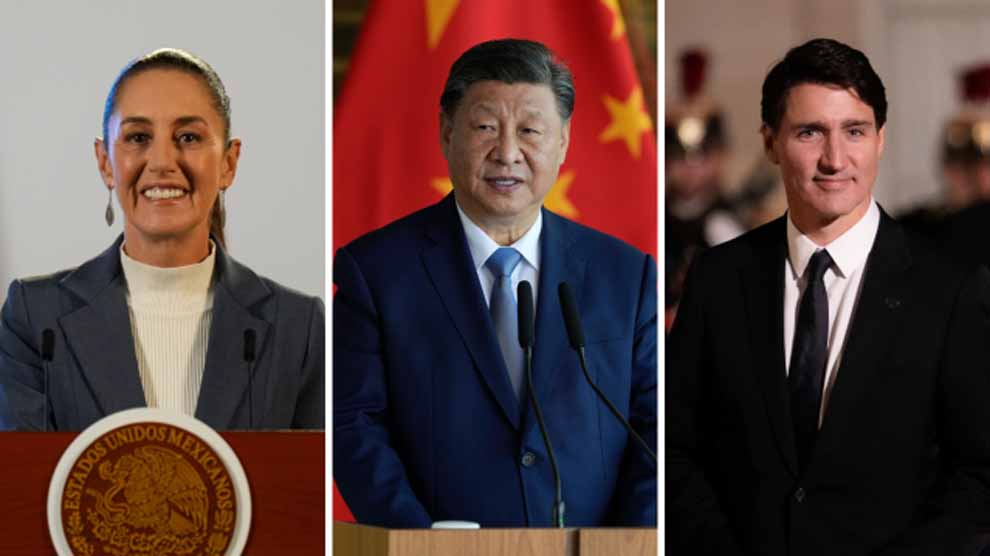
Canada, Mexico, China respond to Trump tariff threats
Officials from Canada, Mexico and China have warned US President-elect Donald Trump’s pledge to impose sweeping tariffs on America’s three largest trading partners could upend the economies of all four countries.
“To one tariff will follow another in response and so on, until we put our common businesses at risk,” Mexico’s President Claudia Sheinbaum said.
Trump vowed on Monday night to introduce 25% tariffs on goods coming from Mexico and Canada and an additional 10% on goods coming from China. He said the duties were a bid to clamp down on drugs and illegal immigration.
Canada’s Prime Minister Justin Trudeau said he spoke to Trump in the hours after the announcement and planned to hold a meeting with Canada’s provincial leaders on Wednesday to discuss a response.
A spokesman for China’s embassy in Washington DC told the BBC: “No-one will win a trade war or a tariff war.”
The international pushback came a day after Trump announced his plans for his first day in office, on 20 January, in a post on his social media website, Truth Social.
Trudeau said his country was prepared to work with the US in “constructive ways”.
“This is a relationship that we know takes a certain amount of working on, and that’s what we’ll do,” Trudeau told reporters.
In a phone call with Trump, Trudeau said the pair discussed trade and border security, with the prime minister pointing out that the number of migrants crossing the Canadian border was much smaller compared with the US-Mexico border.
READ ALSO:
- EFCC to arraign Yahaya Bello today for alleged N110bn fraud
- Court dismisses Sanwo-Olu’s suit to stop EFCC from arresting him after tenure expires
- US University opens 2025 scholarships for international students
Trump’s team declined to confirm the phone call.
But Trump spokesman Steven Cheung added that world leaders had sought to “develop stronger relationships” with Trump “because he represents global peace and stability”.
Mexico’s President Sheinbaum told reporters on Tuesday that neither threats nor tariffs would solve the “migration phenomenon” or drug consumption in the US.
Reading from a letter that she said she would send to Trump, Sheinbaum also warned that Mexico would retaliate by imposing its own taxes on US imports, which would “put common enterprises at risk”.
She said Mexico had taken steps to tackle illegal migration into the US and that “caravans of migrants no longer reach the border”.
The issue of drugs, she added, “is a problem of public health and consumption in your country’s society”.
Sheinbaum, who took office last month, noted that US car manufacturers produce some of their parts in Mexico and Canada.
“If tariffs go up, who will it hurt? General Motors,” she said.
Meanwhile, a spokesman for China’s embassy in Washington, Liu Pengyu, told the BBC that “China-US economic and trade co-operation is mutually beneficial in nature”.
He denied that China allows chemicals used in the manufacture of illegal drugs – including fentanyl – to be smuggled to the US.
“China has responded to US request for verifying clues on certain cases and taken action,” Liu said.
“All these prove that the idea of China knowingly allowing fentanyl precursors to flow into the United States runs completely counter to facts and reality.”
President Joe Biden has left in place the tariffs on China that Trump introduced in his first term, and added a few more of his own.
Currently, a majority of what the two countries sell to each other is subject to tariffs – 66.4% of US imports from China and 58.3% of Chinese imports from the US.
Speaking in the House of Commons in Ottawa, Trudeau told lawmakers that “the idea of going to war with the United States isn’t what anyone wants”.
He called on them to not “panic”, and to work together.
“That is the work we will do seriously, methodically. But without freaking out,” he said.
The leaders of Canadian provinces suggested that they would impose their own tariffs on the US.
“The things we sell to the United States are the things they really need,” Deputy Prime Minister Chrystia Freeland said on Tuesday. “We sell them oil, we sell them electricity, we sell them critical minerals and metals.”
America’s northern neighbour accounted for some $437bn (£347bn) of US imports in 2022, and was the largest market for US exports in the same year, according to US data.
Canada sends about 75% of its total exports to the US.
Doug Ford, the premier of Ontario, Canada’s most populous province, said on Monday the proposed tariff would be “devastating to workers and jobs in both Canada and the US”.
“To compare us to Mexico is the most insulting thing I’ve ever heard,” said Ford.
Ford was echoed by the premiers of Quebec, Saskatchewan and British Columbia, while a post on the X account of Alberta Premier Danielle Smith acknowledged that Trump had “valid concerns related to illegal activities at our shared border”.
The Canadian dollar, the Loonie, has plunged in value since Trump vowed to impose tariffs on Canadian imports come January.
The Canadian dollar dipped below 71 US cents, the lowest level the Loonie has fallen to since May 2020, when Trump threatened to impose tariffs on Canadian goods during his first stint as US president. The Mexican peso fell to its lowest value this year, around 4.8 cents.
Canada, Mexico, China respond to Trump tariff threats
BBC
International
Relief as Israel agrees to ceasefire with Lebanon
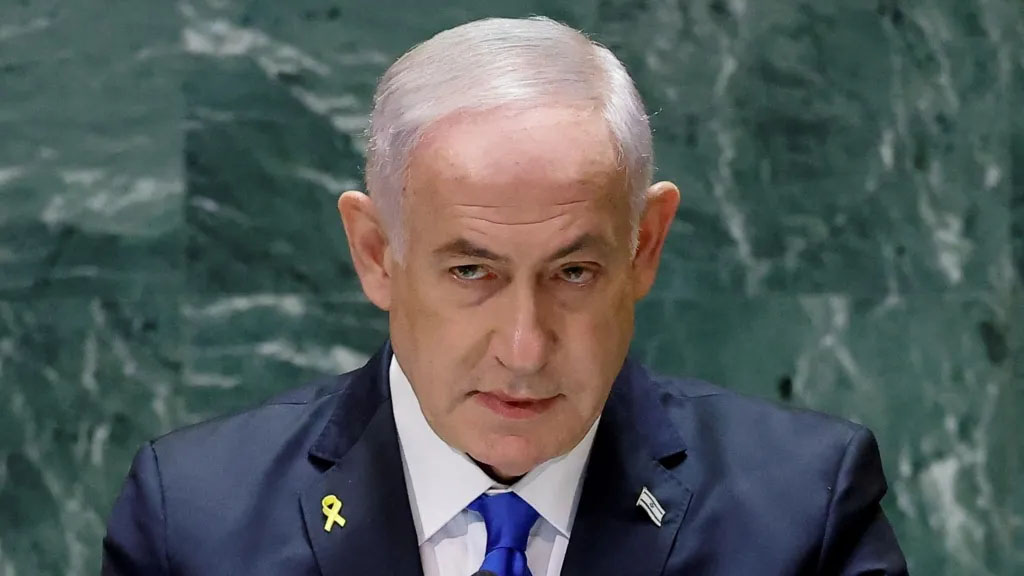
Relief as Israel agrees to ceasefire with Lebanon
Israeli Prime Minister Benjamin Netanyahu has said he will bring a US-brokered proposal for a ceasefire with Hezbollah in Lebanon to his government for approval as soon as Tuesday evening.
He said in a televised address that he would put “a ceasefire outline” to ministers “this evening”.
He however did not say how long the truce would last, noting “the length of the ceasefire depends on what happens in Lebanon”.
But it later learnt that the ceasefire would is for 60 days.
During the period, Hezbollah fighters are expected to retreat 40 kilometres from Israel’s border, with Israeli ground forces withdrawing from Lebanese territory.
“If Hezbollah violates the agreement and attempts to rearm, we will strike,” Netanyahu warned.
Key Israel backer the United States has led ceasefire efforts for Lebanon alongside France.
US President Joe Biden is optimistic the deal will lead to a “permanent cessation of hostilities”.
Biden added that the US would lead another push for a ceasefire in Gaza.
“In full coordination with the United States, we are maintaining full military freedom of action,” Netanyahu said, outlining the seven-front war Israel says it faces in Gaza, the occupied West Bank, Yemen, Iraq, Syria, Lebanon and Iran.
Even as Netanyahu spoke about the ceasefire, the Israeli military carried out multiple strikes on heart of Beirut while the army said some 15 projectiles had entered Israeli airspace from Lebanon.
Demonstrators raise placards and Israeli flags during a protest in front of the Israeli Defence Ministry in the coastal city Tel Aviv on November 26, 2024, against a possible ceasefire with Hezbollah in Lebanon. – Israel’s security cabinet has started discussing a proposed ceasefire deal in its war with Hezbollah in Lebanon, an Israeli official confirmed to AFP on November 26. (Photo by Jack GUEZ / AFP)
The war in Lebanon escalated after nearly a year of limited cross-border exchanges of fire begun by Hezbollah, which said it was acting in support of Hamas after its October 7, 2023 attack on Israel, which sparked the war in Gaza.
The war has killed at least 3,823 people in Lebanon since October 2023, according to the health ministry, most of them since September.
On the Israeli side, the hostilities have killed at least 82 soldiers and 47 civilians, authorities say.
Netanyahu said the ceasefire would allow Israel to focus on “the Iranian threat” and ramp up its fight against Hamas in Gaza.
“With Hezbollah out of the picture, Hamas is left on its own,” he said.
“We will increase our pressure on Hamas and that will help us in our sacred mission of releasing our hostages.”
During last year’s Hamas attack, militants took 251 hostages, of whom 97 are still held in Gaza, including 34 the army has declared dead.
International
Israeli strikes pound central Beirut, suburbs
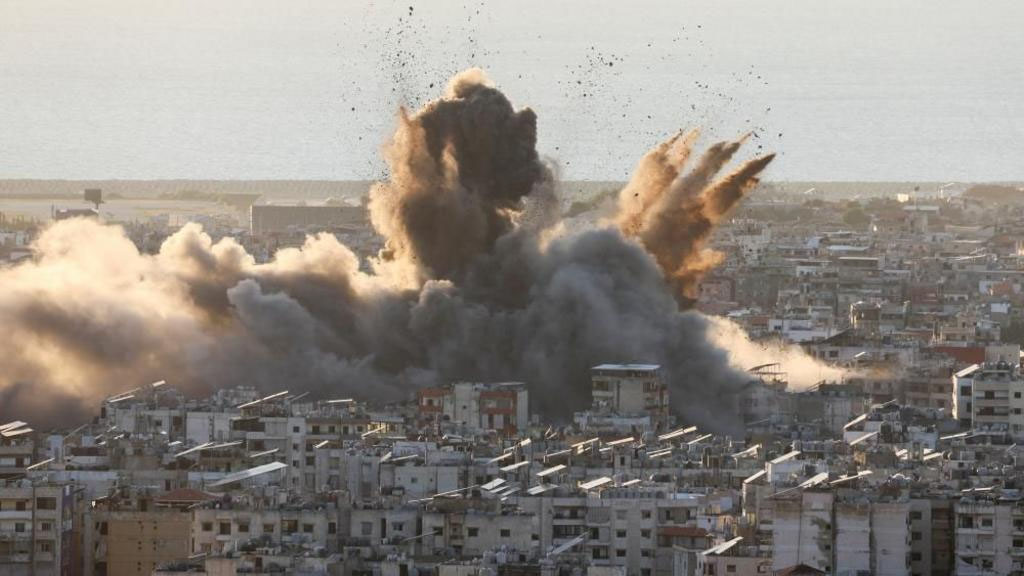
Israeli strikes pound central Beirut, suburbs
BEIRUT: Israeli strikes pounded a densely-populated part of the Lebanese capital and its southern suburbs on Tuesday, hours ahead of an anticipated announcement of a ceasefire ending hostilities between Israel and Lebanese armed group Hezbollah.
A strike on Beirut hit the Noueiri district with no evacuation warning and killed at least one person, Lebanon’s health ministry said in a preliminary toll.
READ ALSO:
- French football star, Paul Pogba’s blackmail trial begin in Paris
- French football star, Paul Pogba’s blackmail trial begin in Paris
- Vigilante arrested in Anambra for robbery
Minutes later, at least 10 Israeli strikes hit Beirut’s southern suburbs. They began approximately 30 minutes after the Israeli military issued evacuation orders for 20 locations in the area, the largest such warning yet.
As the strikes were under way, Israel’s military spokesperson Avichay Adraee said the air force was conducting a “widespread attack” on Hezbollah targets across the city.
Israeli strikes pound central Beirut, suburbs
ARAB NEWS
-

 metro24 hours ago
metro24 hours agoBREAKING: Port Harcourt refinery begins operation
-

 Business3 days ago
Business3 days agoJust in: Dangote refinery reduces petrol price for marketers
-

 metro2 days ago
metro2 days ago40-foot container falls on car in Lagos
-
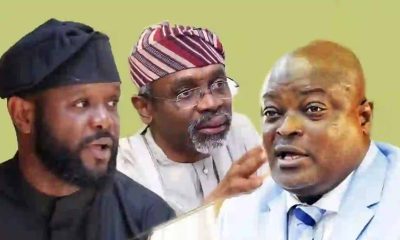
 Politics3 days ago
Politics3 days ago2027: Lagos Speaker, Obasa joins gov race, may battle Seyi Tinubu, others
-

 Politics2 days ago
Politics2 days agoLagos 2027: Seyi Tinubu campaign team releases his life documentary
-

 International2 days ago
International2 days agoTrump to sack 15,000 transgender officers from U.S. military: Report
-

 Education16 hours ago
Education16 hours agoUS University opens 2025 scholarships for international students
-

 Entertainment2 days ago
Entertainment2 days agoPolygamy best form of marriage for Africa – Okey Bakassi

